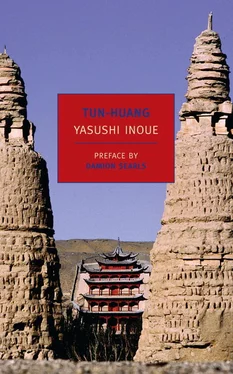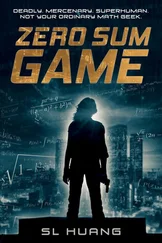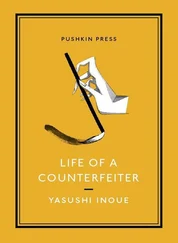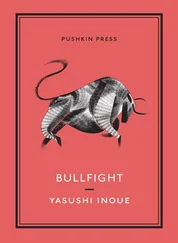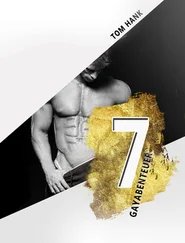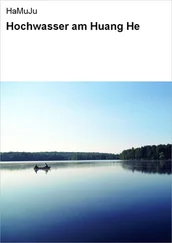Night fell slowly. The pale moon gradually grew brighter and soon shone with a reddish glow. Hsing-te felt faint as he stared fixedly at the sky. The stars began to glimmer around the moon, then filled the heavens. His mind was blank. For some reason, he did not even feel the cold. But he was hungry. If only he could get a drop of water. He looked around, but naturally there was nothing in sight. There was only the vast, sandy plain.
Hsing-te suddenly remembered the food that he was offered by Kuang just before their fight. If he only had that, he could stave off starvation temporarily. Setting his mind to this, Hsing-te forced himself up. All his joints ached. Then he saw another man groveling along the ground not far from where he stood. He recognized Kuang immediately. He was searching for something, and from time to time, he scratched the sand with his hand. At first, Hsing-te did not comprehend what Kuang was up to, then he realized that Kuang was searching for the stones from the necklace. It was impossible to find even a single stone in the sandy desert after hundreds of cavalrymen had passed over it.
Hsing-te forgot that he had got up to search for the piece of bread and watched Kuang’s futile efforts. At length, Kuang stood up in the moonlight. For some reason, he just stood there. After a bit, he very slowly thrust his right foot forward. At the same time his arms moved oddly, like those of some mechanical doll. Kuang was injured.
Hsing-te lay down again. The pathetic cries of camels could be heard in the distance. As he listened, he gradually fell into a comatose slumber.
Hsi-hsia gained complete control of the area west of the Yellow River by defeating and devastating Sha-chou and annihilating the Ts’ao dynasty, thus destroying the long Chinese domination. To the five provinces of Hsia-chou, Yin-chou, Sui-chou, Yu-chou, and Ching-chou, long under their domination, the Hsi-hsia added Ling-chou, Kan-chou, Liang-chou, Su-chou, Kua-chou, and Sha-chou; thus Hsi-hsia gained power as well as renown. By a stroke of good fortune the Muslims in Khotan put an end to their eastern expansion, but did not enter Sha-chou after all.
As soon as he had conquered Sha-chou, Yüan-hao divided his great armies into two and established twelve military headquarters, thus tightening the defense of his entire territory.
In 1038, Yüan-hao changed the name of his country from Hsi-hsia (“Western Hsia”) to Ta-hsia (“Great Hsia”), officially named Hsing-ch’ing its capital and declared himself emperor. He then sent an official message to China hinting at the severance of relations. China replied by stripping Yüan-hao of the noble rank given him and publishing a decree setting a price on his head. Then the Chinese court nominated Generals Hsia Sung and Fan Yung to take charge of countermeasures against Hsi-hsia. Yüan-hao retaliated with an assault on the Chinese defense troops and then mounted a forceful invasion of all the Chinese border territories. For that reason, the frontier regions were in great turmoil.
In China, the military leadership was reshuffled several times; there were personality clashes and many differences of opinion over the policy toward Hsi-hsia. After Hsia Sung and Fan Yung came Han Ch’i and Fan Chung-yen, then Chen Chih-chung, Wang Yen, and P’an Chi replaced their predecessors, but none of them could block Yüan-hao’s invasions.
In 1041, Yüan-hao mounted another strong attack and overran the frontier territories to reach the Wei River. The Hsi-hsia cavalry ran rampant in Shensi province and to the north of Wei. East of the Ching and Fen rivers, the people had to barricade themselves in their towns and defend themselves as best they could.
In Central Asia at this time, large Hsi-hsia forces were stationed in Kan-chou and Kua-chou, where military headquarters were established. Although no wars were raging in the west, Hsi-hsia ruled over the various tribes with an iron hand, as it directed all national effort into battling China. Hsi-hsia was particularly harsh with the Chinese living in the frontier regions, actually treating them as prisoners of war. Just as the Chinese in Sha-chou wore Turfan garments when under Turfan rule, they now donned Hsi-hsia dress and slunk around with stooped shoulders and bowed heads.
The fate of Governor Ts’ao and his family never came to light. That Ts’ao Hsien-shun had perished in battle is an established fact, but the others seemed to have vanished into thin air and nothing was heard of them. Rumor had it that some members of the Ts’ao family fled to the western territories of Qoco or Khotan, but this was never verified. Traders came from those places to do business as usual, but they brought no news of them.
The fourth summer after the fall of Sha-chou, it was rumored in town that the elder brother of Hsien-shun’s widow had been captured and decapitated, but the truth of the story was uncertain.
The Thousand Buddha Caves were forgotten for a long time after they fell into Hsi-hsia hands. Yüan-hao was a devout Buddhist and many Hsi-hsia people were also Buddhists, but no one had much time for religion during the prolonged war with China.
The Three Realms Temple located in front of the Thousand Buddha Caves was temporarily used as a military billet and its interior was damaged by the soldiers. After the troops departed it was completely abandoned and left to fall into disrepair.
An incident took place just at the time that news of the decapitation of Hsien-shun’s brother-in-law was circulating. One day a caravan of about one hundred camels arrived at the foot of the hill in the Ming-sha mountains where the Thousand Buddha Caves are situated amid the undulating desert. As soon as the group arrived, they put up close to ten tents of various shapes and sizes. Above the largest tent was a banner with the symbol “Vaisravana.” Toward evening, the banner flapped noisily as the strong desert winds rose. Late that night it began to rain; then the rain turned into a violent storm.
Deep in the night, the men of the caravan folded their tents in the downpour. Both men and animals were drenched as they made their way around the foot of the Ming-sha mountains to the other side, where numerous caves of all sizes were located.
At the order of the caravan leader the group stopped briefly at the open space beside the Three Realms Temple to leave their camels while the men continued on. Just then, lightning streaked above the men’s heads. In the blinding blue flash, the hundreds of caves dug into the cliffs at the base of the Ming-sha mountains were illuminated. Rain water rushed down the rocky cliffs with the force of waterfalls and formed puddles in the shallower caves. The large and small Buddhist statues, visible from the foot of the hill, looked as if they were about to dance. The group walking toward the northern section of the Thousand Buddha Caves resembled ants compared to the scale of the mountain.
With the second streak of lightning, the group of small figures was seen climbing up single file toward the three-storied grotto. There were thirty or forty men in the group.
Some time elapsed before lightning struck the third time. When the flash lit up the whole area, the men had reached the lowest level of the three-storied grotto. Some carried hoes or mallets, others carried poles.
“Start!” Just as this command was issued, a deafening roar of thunder accompanied by another blinding flash of lightning shook heaven and earth. Some men fell to the ground; the others dispersed in all directions. One man raised both arms toward heaven, then keeled over and fell at the cave entrance. All this was then swallowed up by darkness.
The storm at the Ming-sha mountains raged all night, and subsided finally toward dawn. Several men had been electrocuted, but the one lying closest to the cave entrance was clothed differently from the rest. He appeared to be the leader of the group, but his identity could not be determined from his black, charred body. About a month later, it was learned through a caravan man that the deceased had called himself the heir of the Wei-ch’ih royal family.
Читать дальше
